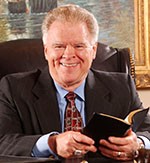By Ken Camp
Southwestern Baptist Theological Seminary President Paige Patterson has acknowledged the seminary recently allowed a Palestinian Muslim to enroll in the school’s Ph.D. program in archaeology.
A Muslim’s enrollment in the Fort Worth, Texas, seminary marks a significant departure from the norm at a school where students normally must present a record of church involvement, evidence of Christian character and a statement about one’s Christian conversion before admission — and where divorced individuals face particularly close scrutiny and students who use alcohol or tobacco are subject to disciplinary measures.
 The seminary’s communications office posted Patterson’s acknowledgment online after Southern Baptist pastor Wade Burleson raised concerns about the matter on his blog.
The seminary’s communications office posted Patterson’s acknowledgment online after Southern Baptist pastor Wade Burleson raised concerns about the matter on his blog.
“For several years, Southwestern Seminary has operated a dig at Tel Gezer in Israel,” Patterson said. “During that time we have been joined in the effort by around 20 of our own students and about 60 students from secular schools and religious schools. We have had both Israelis and Muslims.
“One of these young men from a Muslim background loved our people and asked to study with us. He accepted the necessity of abiding by our moral code of conduct. He is a man of peace, and we agreed to admit him into the archeology program.”
In the online statement, Patterson acknowledged making similar exceptions “on rare occasions” during his tenure as president at Southwestern, Southeastern Baptist Theological Seminary and Criswell College — probably “four or five times” in nearly 40 years of academic administration.
“His intention for the exceptions each time, including this one, was based on a desire to see these individuals understand the good news of Jesus Christ,” the statement from the seminary’s communications office said.
“This man’s progress has been good, and we are especially grateful for the close relations that have been forged with peaceful Muslims and the opportunities that we have had to share biblical truths with them,” Patterson said. “In all of this, there is not even a hint of compromise of our historic position.”
No questions
Wade Burleson, pastor of Emmanuel Baptist Church in Enid, Okla., reported Patterson instructed the admissions office to admit a Muslim student in 2012. He identified the student as Ghassan Sa’id — with his last name withheld.
“In a faculty meeting in 2012, Dr. Patterson warned anyone who questioned him about Muslims being admitted into Southwestern, or anyone who was disloyal to him and discussed this matter with others not associated with Southwestern would be terminated,” Burleson wrote.
Although “the campus is abuzz” about the matter, Burleson said, faculty fear repercussions and students are afraid the school will block their transcripts if they speak out.
In a follow-up blog written after Patterson’s acknowledgment, Burleson wrote: “Patterson’s statement above makes me feel like Southwestern Baptist Theological Seminary has officially entered the Twilight Zone. Seriously.”
“Think about this,” Burleson continued. “According to President Patterson, one no longer has to accept Jesus Christ as personal Lord and Savior to be a student at Southwestern Baptist Theological Seminary, but one must accept ‘our moral code of conduct.’
“In other words, Paige Patterson deems it more important for prospective students of Southwestern to agree to avoid the ‘use and possession of alcohol and tobacco’ than to affirm their acceptance of Jesus Christ as their Lord and Savior.”
Patterson had not responded to an ABPnews/Herald request for comment by Monday afternoon.
It’s not the first time a Southern Baptist seminary has enrolled a student who doesn’t profess Christianity. Rabbi Herbert Waller, who died in 1994, earned a doctor of theology degree at Southern Baptist Theological Seminary in Louisville, Ky., decades before the school shifted to the theological right in the 1980s. Waller, chief rabbi at The Temple in Louisville, was widely known in that city for his involvement in interfaith dialog.
Behavior guidelines
Southwestern Seminary’s published and online documents regarding admission set high standards regarding church involvement, Christian commitment and ethical behavior.
“In its admission policies, the seminary assumes the student has been identified as a prospective minister by announced intent, proven conduct in accordance with Christian standards set forth in the Bible, active church involvement and unqualified support from the church where they are currently members,” the online catalog states in its “admissions policies and procedures” section.
“Applicants must demonstrate church membership and active church involvement to apply for admission to the seminary. Active membership and involvement in a local church is also required of all students for continued enrollment,” the catalog states in its “frequently asked questions” section.
Required credentials include “mature Christian character,” evidence of desire to pursue Christian ministry, a record of active church service, according to the catalog.
“As a Southern Baptist educational institution, the seminary is redemptive, but not rehabilitative, in nature,” it states, noting individuals with serious financial, family, health or emotional problems should not attend seminary.
“Students who have been divorced for less than one calendar year or who are currently separated are usually not accepted. The admissions committee may also take theological, ethical and other issues into consideration for acceptance,” it states.
“Individuals who have been convicted of a crime, other than a traffic violation or a similar misdemeanor where only a fine was assessed, should wait a minimum of two calendar years after the sentence has been served (including probation) before submitting an application.”
